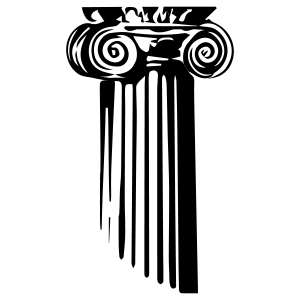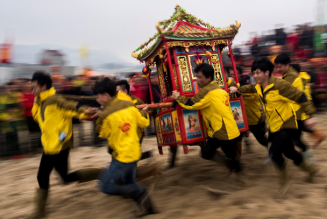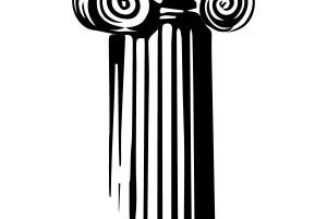Hey everybody,
Today is March 15, and that means we’re two days from St. Patrick’s Day, and four days from the Solemnity of St. Joseph.
Erin go bragh!
Ite ad Ioseph!
and beware the ides of March!
More about those ides after the news.
The news
As Ukrainians continue to fight for their country, the human toll of Russia’s invasion grows daily. Nearly three million people have fled the country as refugees, almost two million more are displaced from their homes. City blocks have been flattened, a maternity hospital was bombed, hundreds of civilians across the country the country are dead, among them children.
While Ukraine continues defending itself, some in the country have turned toward protecting the country’s artistic treasures — the churches, icons, painting, and statues that carry the culture and history of a nation. Some will be, no doubt, destroyed.
Elizabeth Lev is among the foremost Catholic art historians in the world — she is an expert both on artistic movements in history, and on the deep spiritual and cultural meaning of art. She wrote at The Pillar on Sunday about some of Ukraine’s most famous and important works of art — and about the stories they tell:
“One might wonder whether it makes sense to worry about these small remnants of an artistic tradition that has been decimated time and time again, but these works speak of a people whose very identity has been repeatedly challenged and yet through fracture and destruction has held together.
…
Perhaps the most important work of art in Ukraine sits inside St Sophia, the icon of the “unbreakable wall,” an 18-foot-tall mosaic of the Mother of God, hands raised in prayer. She has withstood centuries of raids, fires and bombing, unshaken and unharmed.The inscription next to her is from Psalm 46: ‘God is in her midst and does not move.” She invites believers to invoke the Lord in this difficult hour, “our refuge and strength, a very present help in trouble.’”
—
Sports fans: March Madness begins today, and 11 of the 68 teams in the NCAA basketball tournament are from Catholic schools.
If you’re looking for a team for which to cheer: whether a much-favored powerhouse, or a long-shot Cinderella, we’ve got a guide to the Catholic colleges hoping to win it all.
If I had to choose on mascots alone, I’d probably root for the Peacocks of St. Peter’s University in Jersey City. Why? Well, because I’m from New Jersey, and I’m amused by the prospect of peacocks strutting across the 1-9 or Route 139, some of the trickiest bits of traffic in the country.
—
Bishop Rick Stika of Knoxville is facing both civil litigation and a Vatican investigation, after he admitted to replacing a diocesan investigator looking into the allegation that a seminarian committed sexual assault.
A Tennessee woman told The Pillar that when she reported serious clerical misconduct in another case, Bishop Stika told her she had “ruined a priest’s life.”
According to the Knoxville diocese, the priest faced neither a canonical process nor the diocesan review board, despite an allegation of misconduct involving minors.
It is not clear when, or if, the Vatican will act on allegations first raised against Stika by priests of his own diocese. But in the meantime, here’s a view from on the ground in Knoxville.
—
The bishops of the Nordic nations of Sweden, Denmark, Norway, Finland, and Iceland signed last week an open letter to their brother bishops in Germany, expressing their “anxiety” and “concern” at the ongoing “synodal way” in Germany.
If you’re keeping score at home, that means the Nordic bishops, the Polish bishops, several dicasteries of the Holy See, and the Roman Pontiff – Pope Francis – have all registered serious concerns about the German “synodal path.”
So what happens next? Read here. And then, frankly, I’m curious how you think the “synodal path” will play out. Let us know in the comments.
Meaty questions
We got a lot of email and texts at The Pillar, and for the past week, we’ve mostly been getting messages asking about eating meat. It’s Lent, you see, and that means many of you are spending time thinking about when you can and can’t eat meat.
We approve.
Of course, some of you had a simple question: Can we eat meat on the Annunciation? The answer is yes.
The Annunciation, March 25, is a Friday in Lent, but also a solemnity, or major feast. Catholics are not bound to abstain from meat in solemnity, because we’re urged to celebrate a feast with actual feasting. That’s what it means to live the liturgical calendar.
But some of you had a different question. Saturday, March 19 is the solemnity of St. Joseph. And because the Church says that solemnities officially begin the evening before their calendar date, some of you wondered if that means Catholics can eat meat – to celebrate St. Joseph – on the evening of March 18, which is a Friday.
We talked on the phone Monday with a number of canon lawyers about this question. We read some historical documents. We debated their meaning back and forth. We talked about it on a podcast. And, ultimately, we did not arrive at one clear answer – instead, we found canon lawyers taking different positions on the question.
So we put all of that into an explainer yesterday.
After we published that explainer, we heard from even more canonists, from readers, and even from an esteemed archbishop, all of whom wanted to weigh in on this question. Many of them had pretty decent arguments in favor of one position or another.
(The archbishop, by the way, was on my side of the debate, not Ed’s. Take that for what it’s worth.)
As we started looking into this question, I found myself a bit irritated that the law seems, at the very least, open to interpretation.
It seemed to me that with a few strokes of a pen, the pope could clarify what the rule is (and hopefully affirm that I am right, like that archbishop did.)
But some of you pointed out that Catholic cultures in different parts of the world begin the feasting part of their feasts at different times — marking solemnities in different ways. And those cultural customs play into the way canonists read the Church’s law. This makes sense, since custom is the best interpreter of the law.
And frankly, I find this beautiful.
Both law and custom exist to orient us, in this case, toward living liturgically — toward choosing periods of fasting and feasting, to mark the Church’s calendar, to remember the saints in heaven, and to give glory to the presence of Christ and his Church in our lives.
I know, because I’ve heard from you, there are readers who find discussion about when the feasting should begin a bit distasteful — the idea for you seems to be that a kind of hair-splitting focus on when to feast or fast is missing the point of the solemnity. Really, I disagree.
It’s beautiful that different customs have arisen in different parts of the world, all aimed at honoring the celebration of a solemnity. And I think it’s beautiful that we can interpret the ecclesiastical norms of the Church through the lived experience of those customs.
Asking questions like this can help us to see the beauty of a Church in which the liturgical calendar has shaped actual Christian cultures in different places in different ways, with very practical customs that seem, to many, nearly unchangeable.
All of that points to a way of living the Christian faith — not only believing it, but putting into practical reality the calendar of the Church, which aims to shape us toward holiness.
So can you eat meat on Friday March 18 in the evening? I won’t.
It’s not usually an American custom to begin feasting for a solemnity the evening before it begins, even while the liturgical feast has begun. I interpret the law through the lens of that custom — and, again, I’ve heard from plenty of canon lawyers who back up my position.
But as of yet, the Church has not said explicitly that it’s my way or the highway.
She has instead let customary practices grow up around feasting and fasting, all of which, in beautiful ways, remind us that we’re made for the eternal feast of the heavenly banquet.
I’ll ask St. Joseph’s intercession during the very small sacrifice of abstinence on Friday, and again in the joy of feasting on Saturday. If you’ve got a different set of customs, and the Church hasn’t given some definitive guidance where you live, well, Blessed Feast of St. Joseph.
May it be a great feast.
Great Caesar’s Ghost!
On March 15, 44 B.C., members of the Roman senate stabbed Julius Caesar more than 20 times during a senate meeting in Rome. They were led by Marcus Brutus and Gaius Cassius, who aimed to restore Rome to its glory, and justice, as a republic. Instead they saw Rome fall into civil war.
Most of us know the story from the Shakespeare play, in which the Ides of March, the new moon’s arrival, are a bad omen portending the play’s tragedy.
Some readers, though, might know about Caesar from an unusual tweet from Senator Lindsey Graham this month, which urged a “Brutus in Russia” to assassinate Vladimir Putin.
This is not the kind of thing you see from a senator every day. And it’s kind of a surprising call, given the way that Caesar’s death led to civil war, and to Brutus’ death, which saw Rome taken not by “the noblest Roman of them all,” but by those motivated by self-interest rather than virtue — eventually seeing Octavian style himself Augustus, and then as the divi filius, the “son of the divine,” who concentrated and solidified the very powers that gave Caesar’s assassins concern.
I’m not sure a future Russian leader who proclaims himself divine is really what Senator Graham is hoping to see accomplished.
But the story of Caesar’s death does point out something I suspect many of us already know to be true — that whatever happens in Ukraine, a smooth, peaceful transition of power in Russia is not the likely end of Vladimir Putin’s presidency.
The war in Ukraine has already had global effect. Consider only one example: Egyptians, who import wheat from Russia and Ukraine, are preparing now for the food shortage they’ll soon face, and whatever chaos that will bring across the Middle East. For China, that means opportunity to solidify its Middle Eastern influence — a move which will obviously have long and serious global repercussions.
This war will not end at the Ukrainian borders, even if the rockets and shelling go no further. For Christians, this means serious discernment on what it means to serve the Prince of Peace. There are difficult years ahead.
In the meantime, here are the funeral orations from Julius Caesar, performed by George Coulouris and Orson Welles in a very good radio production of the play:
We are at work right now at The Pillar on a number of significant stories we hope to publish soon. And, actually, this month we’ve already had some big ones: a serious interview with Cardinal Tomasi on the Order of Malta, breaking a Vos estis investigation into a Brooklyn auxiliary bishop, smart and important coverage on the state of the Church in Ukraine, and more, including some very good interviews.
All of that happens because of our readers and subscribers — you. And we’re working now to add more correspondents, try new kinds of coverage, and take deeper, data-driven dives on serious questions in the Church’s life. If you think that matters, please, keep sharing The Pillar with your friends — the formula is simple: the more readers and subscribers we have, the more cool stuff we can do, and, we hope, the better we can serve the Church. That’s why we ask.
And as a reminder, we’re engaged in a little Lenten almsgiving project: For every new reader on our mailing list this month, we’re giving $1 to the Ukrainian Catholic Eparchy of Philadelphia’s War Victims and Humanitarian Crisis Fund. And for every new paid subscriber, we’ll donate $10 to the same fund.
Thanks for helping us out with that.
Happy St. Patrick’s Day. Blessed Solemnity of St. Joseph. Beware the ides of March.
Be assured of our daily prayers. And please pray for us, we need it.
Sincerely yours in Christ,
JD Flynn
editor-in-chief
The Pillar
Join Our Telegram Group : Salvation & Prosperity












